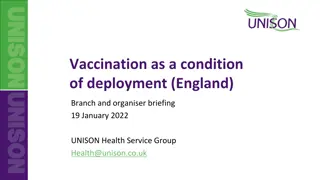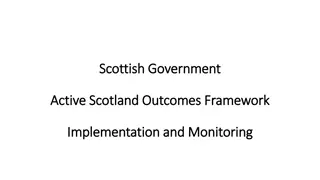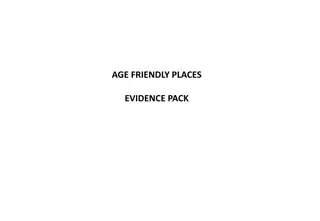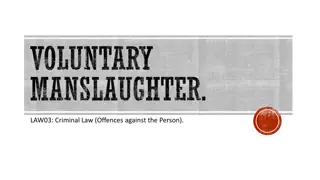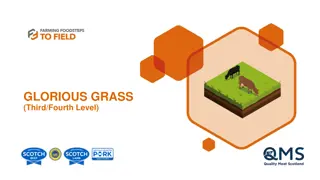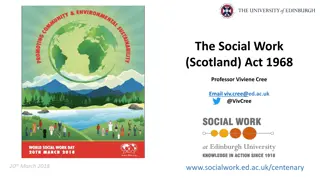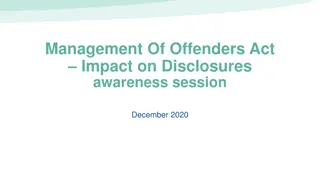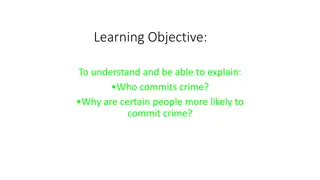Age of Criminal Responsibility - Scotland Act 2019 Briefing
This briefing outlines the key duties of the Age of Criminal Responsibility (Scotland) Act 2019, aiming to protect children from early criminalization and ensuring proper support for their well-being. It emphasizes the importance of aligning with children's rights under the UN Convention on the Rights of the Child and the potential positive impact of raising the age of criminal responsibility from 8 to 12 in Scotland.
Uploaded on Mar 06, 2025 | 2 Views
Download Presentation

Please find below an Image/Link to download the presentation.
The content on the website is provided AS IS for your information and personal use only. It may not be sold, licensed, or shared on other websites without obtaining consent from the author.If you encounter any issues during the download, it is possible that the publisher has removed the file from their server.
You are allowed to download the files provided on this website for personal or commercial use, subject to the condition that they are used lawfully. All files are the property of their respective owners.
The content on the website is provided AS IS for your information and personal use only. It may not be sold, licensed, or shared on other websites without obtaining consent from the author.
E N D
Presentation Transcript
Age of Criminal Responsibility Age of Criminal Responsibility (Scotland (Scotland) Act ) Act 2019 (ACRA) (ACRA) Briefing December 2021 2019
Purpose of briefing Purpose of briefing Aim: To provide information for social work in relation to the key duties in the Act To highlight key information in the Statutory Guidance (Investigative Interviews and Use of a Place of Safety) To explore practice issues as outlined in the Operational Guidance
Policy Intention Policy Intention to protect children from the harmful effects of early criminalisation, while ensuring that children and their families receive the right support the child s wellbeing is a primary consideration interventions must aim to protect children, reduce stigma and ensure better future life chances increasing the age of criminal responsibility from 8 to 12 aligns with the current minimum age of criminal prosecution in Scotland increasing the age of criminal responsibility has the potential to bring about a positive cultural shift in how the harmful behaviour of children, and the issues that lead to it, is viewed and understood in Scotland to protect the safety and meet the needs of those involved in an incident including any victim(s) and the community
Childrens Rights Children s Rights : : UN Convention on the UN Convention on the Rights of the Child Rights of the Child (UNCRC) (UNCRC) the rights of the child must be properly recognised, upheld and protected in line with the UNCRC; the UNCRC states that children who come into conflict with the law have a right to be treated fairly, with appropriate safeguards and in a manner consistent with the child s sense of dignity and worth (Article 40); children also have the right to participate effectively in proceedings, have their views taken into account (Article 12) and to have their privacy respected (Article 16); it is crucial that the approach taken by all professionals takes account of the evolving capacities of the child (Article 5).
Childrens Rights Children s Rights The Act reflects Scotland s commitment to international human rights standards: children under 12 will no longer be stigmatised by being criminalised at a young age, due to being labelled as an offender ; children under 12 are not disadvantaged by having convictions for the purposes of disclosure, which can adversely affect them later in life; the position for care experienced children improves; the new age of criminal responsibility aligns with longstanding presumptions around maturity, rights, and participation; United Nations Convention on the Rights of the Child (Incorporation) (Scotland) Bill is a proposed new law that will incorporate the UNCRC into the law in Scotland; the age of 12 also has other existing significance in Scots law.
Trauma informed Trauma informed approach approach Trauma is often defined as an event, a series of events or a set of circumstances that is experienced by an individual as physically or emotionally harmful or life threatening ; Those who experience trauma are at higher risk of experiencing negative outcomes at all stages of their lives; The Independent Care Review findings highlight the traumatic experiences of many of the 15,000 children in Scotland s care system, and evidence shows that care-experienced children are more likely to experience poorer outcomes across health, education and employment, compared to non- care-experienced children; There is growing evidence that where the impact of trauma is understood by staff, trauma-informed systems and practice are adapted accordingly, and can result in better outcomes.
Trauma informed approach to children who Trauma informed approach to children who have come into conflict with the law have come into conflict with the law A child's wellbeing is the primary consideration; Negative early life experiences can leave some children extremely vulnerable to environmental pressures and this can, in turn, contribute to the emergence of forms of harmful behaviours in childhood; A child who has behaved in a manner that has caused serious harm (including sexual harm) to another person, may themselves have experienced childhood adversity and difficulties such as significant loss, abuse, neglect, trauma, and a disrupted home and school life; A holistic approach to understanding and responding to the needs of children, including those involved in harmful behaviours, helps to improve life chances, promotes positive outcomes and makes GIRFEC a reality; A child centred approach is necessary to consider the wider influences on a child s behaviour, developmental needs and wellbeing.
Policy and practice alignment: Policy and practice alignment: Protecting children is the primary consideration ACR Guidance and policy aligns to child protection processes and practice; GIRFEC emphasises the need to take a child centred approach, understanding the wellbeing of a child in their current situation, taking into consideration the wider influences on a child or young person and their developmental needs; Compatible with Scotland s approach to welfare and the protection of children as represented within the ethos and principles of the Kilbrandon report which informed the establishment of the Children s Hearing system; The Kilbrandon vision of a welfare approach for young people in trouble or at risk continues to ensure that the system considers and deals with the underlying issues in a child s life.
Policy and practice alignment: Policy and practice alignment: #Keepthepromise- The Promise : emphasises that families must be given support to overcome the difficulties they may encounter Meaningful engagement with families must ensure their voices are heard and they are involved in decisions that affects them reducing the criminalisation of care experienced children UNCRC (Incorporation) (Scotland) Bill Incorporation means children's rights will be legally protected in Scotland It will mean that that public authorities must take steps to respect children's rights in their decisions and actions
Policy and practice alignment: Policy and practice alignment: Barnahus (Scottish Bairns Hoose) All children in Scotland who have been victims or witnesses to abuse or violence or whose behaviour has caused significant harm will have access to trauma informed recovery, support The intention is that children under the age of criminal responsibility will be able to access Barnahus Youth Justice Standards and guidance Early and effective intervention
Key dates: Bill passed unanimously by the Scottish Parliament in 2019 and received Royal Assent on 11 June 2019 It has not been possible for a child to be referred to a children s hearing on the basis of the offence ground, in relation to behaviour that occurred whilst that child was younger than 12 since 29th November 2019 November 2020 - no longer be possible for a person to acquire a criminal conviction on the basis of behaviour that occurred when they were under 12. Act will fully commence on 17 December 2021
The Act : Part 1 The Act : Part 1 This Part of the Act increases the age of criminal responsibility in Scotland from 8 to 12. Once it is commenced this will achieve the principal policy objective of the Act, raising the age of criminal responsibility to 12 it says a child under the age of 12 years cannot commit an offence This will commence on 17 December 2021
Part 1 Part 1 The Act raises the age of criminal responsibility to 12 years. this means that a child under the age of 12 cannot be charged or arrested for an offence, and police will no longer have recourse to their criminal justice powers. in practice this will mean that a child under 12 will no longer be held criminally responsible for their actions, however the police will still have a duty to record and fully investigate any allegations of crime. this also means that the use of language is important, and any reference to the child must not be in the context of criminality.
Referral to Childrens Hearing Referral to Children s Hearing Scottish Government wanted to make a positive difference to children s lives as early as possible by removing the offence ground of referral. This was achieved by section 3 coming into force on 29 November 2019. Since that date, it has not been possible for a child to be referred to a children s hearing on the basis of the offence ground, in relation to behaviour that occurred whilst that child was younger than 12.
Disclosure Of Convictions And Other Information Relating To Time When Person Under 12 Part 2 Commenced in November 2020. The changes made by Part 2 mean that any conduct by a child below the age of 12 that would previously have been recorded as a conviction will no longer be recorded as such. This means that it will no longer be possible for a person to acquire a criminal conviction on the basis of behaviour that occurred when they were under 12.
Part 3 Part 3 Victim Information Victim Information This makes changes to the law that enables the Principal Reporter to provide information to victims. It provides detail of the type of information that can be provided, and the factors the Principal Reporter must consider when deciding whether or not to release the information. Where someone is a victim of seriously harmful behaviour, the Principal Reporter will be able to give them information about the outcome of the referral. This can be done even though the reporter has referred a child to a children s hearing on non-offence grounds (so far as it relates to conduct before the age of 12).
Victims Victims Police and statutory services will take action to protect the safety and meet the needs of those involved including the victim(s) and the community. Responding proportionately and effectively to the needs of a child who has caused harm does not diminishes the rights of victims. They will still be the victim of a crime and entitled to have that crime fully investigated by the police and offered the support that is available to all victims of crime.
Part 4 Part 4 - - Police Investigatory And Other Powers Police Investigatory And Other Powers This creates a package of powers designed to ensure that serious behaviour by any child under the age of 12 can be investigated, and for this to be carried out in a child-centred way that is in keeping with the ethos of removing children from criminal justice processes. From 17thDecember 2021 police officers will be unable to arrest, charge a child under 12 with an offence, or treat them in any way as having committed an offence.
Part 4 of the Act Part 4 of the Act Chapter 1 - Power to take a child under 12 to a place of safety Chapter 2 - Search of children under 12 Chapter 3 - Questioning of Children Chapter 4 - Limitation on taking prints and samples from children under 12 Chapter 5 General provision
Part 4: Part 4: Place Place of S of Safety ( afety (s28 s28) ) Police officers may take a child (under 12) to a place of safety in the most serious cases where they believe that it is necessary to manage an immediate risk of significant harm to another person. The criteria for taking a child to a place of safety sets a high bar test for use of the powers. Police officers can intervene in emergency situations to protect individuals and communities. Police have the power to take a child to a place of safety to ensure the safety of others who may be at immediate risk of significant harm or further such harm from the child.
Place Place of Safety ( of Safety (s28 s28) ) This emergency power allows police to take the child to a place of safety and to keep the child there. The use of the power must be must be necessary and proportionate. Taking a child to a place of safety must only be used as a measure of last resort, in relation to the protection of any other person from an immediate risk of significant harm (or further such harm). The need to safeguard and promote the wellbeing of the child is a primary consideration. As soon as practicable after police take a child to a place of safety, they must inform a parent.
Place of safety ( Place of safety (s28 s28) ) the child can only be kept in a place of safety for so long as is necessary to put in place arrangements for the care and protection of the child or for an order, authorising the taking of intimate samples from the child, to be obtained. the child must be kept in a place of safety for as short a time as possible, up to a maximum of 24 hours. local authorities and other partners must identify suitable premises to use for this purpose.
Place of safety ( Place of safety (s28 s28) ) it is anticipated that in most situations, police will return a child to their home, by consent, and a place of safety will not be required. police can use this power to take the child home. police will contact the local authority to undertake relevant checks remaining within the family home should always be the priority, where appropriate, or with wider family before other places of safety are considered. Local Authorities have identified other suitable premises to use. the Act permits a child to be taken to a police station however this should be a last resort. Health premised can be used on a case by case basis (for example when forensic samples are required)
Process Where police use s28 powers they will contact social work and advise that they are dealing with an ACRA incident. Police will provide a synopsis of the incident. In all cases police and social work will undertake checks to assess the suitability of any arrangements. Social work will share relevant and proportionate information to inform decision making. Social work will identify the most appropriate Place of Safety for the child in a timeous manner. Police will take the child to the place of safety Social work will make arrangements for the care and protection of the child Social work must record details of the place and the time that the arrangements cease (for reporting requirements) An IRD will take place as soon as practicable
Part 4 Part 4 - - Questioning of Children Questioning of Children The Act limits the power of the police to question a child under 12 to circumstances where police have reasonable grounds to suspect that the child: by behaving in a violent or dangerous way, has caused or risked causing serious physical harm to another person, OR by behaving in a sexually violent or sexually coercive way, has caused or risked causing harm (whether physical or not) to another person. The Act provides different thresholds of harm, dependent upon the type of behaviour exhibited. In order for the police powers under the Act to apply, where the behaviour is violent or dangerous, this must result in serious physical harm being caused or risked, and where it is sexually violent or sexually coercive, then the harm can be physical, sexual or psychological in nature.
Definitions: Definitions: Harmful behaviour can be physical, psychological or sexual in nature. Behaviour is harmful when it results in or is likely to result in unnecessary suffering and/or physical or psychological damage and/or impairment to health and development. The extent to which harm might be considered serious has been defined as harmful behaviour of a violent or sexual nature which is life threatening and/or traumatic, and from which recovery, whether physical or psychological, may reasonably be expected to be difficult or impossible. It is a matter of professional judgement, based on the gathered evidence and context, as to whether the degree of harm to which the victim is suspected of having been subjected, or is likely to be subjected, is 'serious'.
Police questioning Police can question a child believed to be responsible for committing harmful behaviour that does not meet the threshold for an ACRA investigative interview, in an age appropriate way, without applying the provisions in the Act. Constables, including Senior Investigating Officers, should use professional judgement to establish whether using the formal investigative powers within this legislation is necessary and proportionate. A child aged 12 or over may also be questioned under the Act, in relation to behaviour that took place when the child was under 12, but only if it occurred after the date of implementation of the legislation and the child, is at the time of the investigation aged under 16, or 16/17 years of age and on a Compulsory Supervision Order.
Police questioning Where the criteria has been met, the child may only be questioned by police or participate in an investigative interview, in relation to the incident under investigation, if authorised by: Investigative Interview by Agreement s40(2) Child Interview Order (CIO) s44, granted by a Sheriff on application by the police In urgent cases where there is risk of loss of life s54
Investigative Interview Investigative Interview The Act defines an Investigative interview as a meeting or a series of meetings planned by police in collaboration with the relevant local authority that is conducted: by a constable or an officer of a local authority or jointly by a constable and an officer of the local authority Where an investigative interview is required, the Act sets out a prescriptive procedure for its conduct.
Investigative Interviews Investigative Interviews As well as meeting the criteria, additionally, consideration must be given to the the necessity of an interview in relation to the police investigation; the suitability of conducting an interview with the child and, if this would be in the child s best interests and the primary purpose of the investigative interview, which is: to seek an explanation from the child as to what happened; to understand their role, if any, in the incident; and to identify any other people who were involved or may be at risk of harm Through this process, the wellbeing and welfare needs of the child will be identified and assessed and relevant supports identified and put in place.
ACRA Inter Agency ACRA Inter Agency R Referral eferral D Discussion iscussion - -IRD IRD An Inter-agency Referral Discussion (IRD) is the beginning of the formal process of information sharing, risk assessment, analysis and decision-making, following the reported concern about the child s behaviour that has caused or has risked causing serious harm to another person. An IRD in these circumstances aligns with the approach, core principles and approach of an IRD in a child protection situation. It differs in that it will be held in response to concerns about allegations of serious harm by the child against another person and not harm caused to the child.
ACRA Inter ACRA Inter Agency Referral Discussion Agency Referral Discussion - -IRD IRD An ACRA IRD must be convened as soon as reasonably practicable where there are reasonable grounds to believed that a child (whilst aged under 12) has caused or risked causing harm (serious physical or otherwise) to another person. An ACRA IRD will coordinate decision-making and planning and will assess whether the provisions of the Act apply if this has not already been established Where a Sheriff s Order for Forensic Data and Samples is to be sought in respect of obtaining intimate samples, then an ACRA IRD must take place.
Investigative Interview by Agreement Investigative Interview by Agreement It is preferable to hold an interview by agreement where possible. The criteria must be met The child and a parent of the child must provide agreement to the investigative interview about the behaviour to which the investigation relates. It is essential that the ACRA IRD considers the application of the qualifying criteria and the legal status of the child and parent. The parent who has given agreement must act as the Supporter for the child during an interview by Agreement. The child and parent can withdraw their Agreement at any time
Investigative Interview by Investigative Interview by Child Interview Order (CIO) Order (CIO) A CIO authorises an investigative interview of the child to whose behaviour the application relates. The criteria must be met as well as the test for necessity, suitability and if its in the child s best interest The purpose is the same as interview by Agreement An ACRA IRD must have taken place Police will apply for the CIO A Provisional Plan for the interview is required as part of the application The Order will specify the time period for the interview (up to 7 days) The child and parent, Supporter and ChIRP must be given a copy of the Order Child Interview
Application for CIO Application for CIO The Sheriff may grant a CIO if satisfied that the criteria has been met and in making this decision, has considered: the nature and seriousness of the child s behaviour and whether an investigative interview of the child is appropriate given the child s circumstances this includes the child s age and any matter related to the child s behaviour. There are reasonable grounds to believe that the child, while under 12 years of age by behaving in a violent or dangerous way, has caused or risked causing serious physical harm to another person, or by behaving in a sexually violent or sexually coercive way, has caused or risked causing harm (whether serious physical or otherwise) to another person and that an investigative interview of the child is necessary to properly investigate the child s behaviour and the circumstances surrounding it, including whether another person has committed an offence.
Appeal of CIO Appeal of CIO Permission to appeal must be made to the Sheriff Appeal Court. This application must be lodged by a constable or by or on behalf of the child to whom the decision relates. Lodging of the application seeking permission to appeal must be applied for; by the child or their representative within 3 working days, commencing on the day after the child is provided with a copy of the Order or; by the Police, within 3 working days, commencing on the day after the day that the decision to refuse the Order is made and; where, upon receipt of an application, permission to appeal is granted, the appeal must be lodged before the end of 3 working days beginning on the day permission is given. The lodging of an appeal at court suspends the effect of any CIO originally made by the Sheriff.
Role of the Supporter Role of the Supporter During an investigative interview the child has the right to have a Supporter present in the room in which the interview is being conducted Who can be a Supporter: The Act states that where the investigative interview is by Agreement, the child s Supporter must be the parent who gave the Agreement. Where the investigative interview is authorised by a CIO, the Supporter must be aged over 18 and could be the child s parent, but need not be. This means that any person can be considered by the child to be a Supporter, for example, another relative, a family friend, or a support or advocacy worker. It is important to consider the involvement of someone who may have an existing, trusting relationship with the child.
Child Interview Rights Practitioner (ChIRPs) Child Interview Rights Practitioner (ChIRP s) A child who is involved in an investigative interview will have a ChIRP appointed to them. The ChIRP: will provide the child with advice, support and assistance in connection with, and during an investigative interview. must be a solicitor registered with the Children s Legal Assistance Scheme will take a trauma-informed approach in their interactions with the child and is required to act in accordance the competencies and standards of conduct required for registration. will work with social work and police to plan the interview with the child.
The Rights of the Child The Rights of the Child Whether an investigative interview is by Agreement or CIO, the child has the right : to receive relevant information which must be age appropriate and accessible and take account of any developmental factors and communication needs; to have the ChIRP and/ or Supporter present in the room when the interview is being conducted; to have their views considered when identifying a Supporter where there is a CIO; to receive advice, support and assistance from a ChIRP before and during the interview; to a private consultation with the ChIRP before, or at any time during, the interview. The ChIRP must not be denied access to the child at any time during the interview; and not to make any comment or answer any questions during the interview.
The Rights of the Child The Rights of the Child Prior to the start of an investigative interview, the interviewers must ensure that the child is provided with information that contains details of: the behaviour to which the interview relates; the purpose of the interview; their rights in relation to the interview - including their right not to answer questions, and what may happen as a result of the interview. Where the child and parent agree to the investigative interview, they must be provided with a notice in writing (Child Information Leaflet Interview by Agreement) that explains what their agreement means and how to withdraw their agreement at any stage. The child must also be advised of their right to appeal a decision by the Sheriff to grant a CIO. This information will be provided along with the copy of the CIO and will comprise of a Court produced document that explains this process. Social work and Police will work together to ensure that the child and parent/ carers are informed and supported.
The ACRA Investigative Interview Child centred Trauma informed Collaborative Strategy Planning Action Purpose Support Evaluation
General Principles Rights: The child s feelings and views are sought and their rights are respected and protected at every stage. Safety: The investigations process is carefully considered and sufficiently robust to establish the circumstances of serious harmful behaviour, whilst ensuring the safety of all those involved. Wellbeing: The wellbeing of the child is the lens through which all decisions and actions in respect of that child, are taken. Preparation: Processes include early discussion between the lead agencies and co-ordination and partnership with those responsible for the child s care. Understanding: Each stage and any change or decision is explained in a way that makes sense to each child and those responsible for their safe care, taking into account culture, capacity, age and stage. Support: Support will be provided for children and families involved in these processes. Skill: Professionals involved have received the required training and are supervised accordingly to ensure a co-ordinated and child-centred process. Pace: The pace of exploration should be set by the child and the interviewer will remain attuned to the impact of trauma upon the needs and feelings of each child. Place: Investigative processes are conducted in an environment which is child-friendly and accessible to all those attending Improvement: Processes will be evaluated and improved to ensure adherence to standards
Role of the interviewers ACRA Investigative Interviews are planned for and undertaken by two interviewers, one police officer and one social worker, identified during the ACRA IRD. The lead interviewer may be from either police or social work and roles will be agreed at the planning stage The lead interviewer has primary responsibility for asking questions and information gathering. The second will take written notes of the salient points to ensure that all relevant matters are addressed and assist in identifying and reviewing pertinent information about anything the child may disclose.
Plan for the Investigative Interview Where possible, the plan(s) will specify: the specific needs of the child: how the child s rights will be adhered to; the support and assistance required by the child during the interview; any adaptations or special requirements needed for the child; the purpose of the interview and details of the seriously harmful behaviour; the evidential basis upon which the child has been identified as being responsible for the seriously harmful behaviour the role of the interviewers (lead role/ contingency plan); the role of the ChIRP and Supporter; the persons by whom the child may be questioned at each meeting the anticipated period over which the interview will be conducted; the anticipated number of meetings which may take place as part of the interview; the date of each meeting; the location at which each meeting will take place; any other relevant information (e.g. transport of the child to and from the interview authorised in a CIO or in connection with an interview by agreement); what may happen as a result of the interview (ensure consistency with the information provided by the ChIRP to the child and parent); and contingencies should any child protection concerns emerge.
Investigative Interview Investigative Interviews will be visually recorded unless there are specific reasons why this may be inappropriate for the individual child or this is not possible for practical reasons. The logistics of the interview and requirement for equipment will be discussed (in so far as possible) at the ACRA IRD. The use of VRI equipment and the identification of a suitable interviewing facility, will be dependent upon local arrangements. This will be discussed and planned at the ACRA IRD. Careful consideration will be given to when an interview would suit the child and family. Arrangements will be agreed on a case by case basis, based on the child s needs. Decisions should consider any geographic challenges in relation to the practicalities of transporting the child and/or others, to a predetermined location. This is especially important when considering children who reside in rural areas, particularly remote and island locations where there may be limited options.
Child protection concerns If a child s presentation or account gives interviewers reason to believe that the child may have experienced or may be at risk of significant harm, the interviewers have the discretion to make a dynamic judgement as to whether the ACRA investigative interview should be paused or terminated. Therefore the planning for an ACRA investigative interview must involve contingency planning for any child protection issues emerging. This should include planning and preparation with the ChIRP.
(2) In making any determination about how to proceed, the following should be considered, however professional judgement will be required: Child protection considerations: Is there concern about the immediate safety of the child? What is in the best interests of the child at that time? What is the nature, seriousness and immediacy of the harm disclosed? How is the child presenting at that time? Has the child disclosed any injury or discomfort? When did the incident take place?
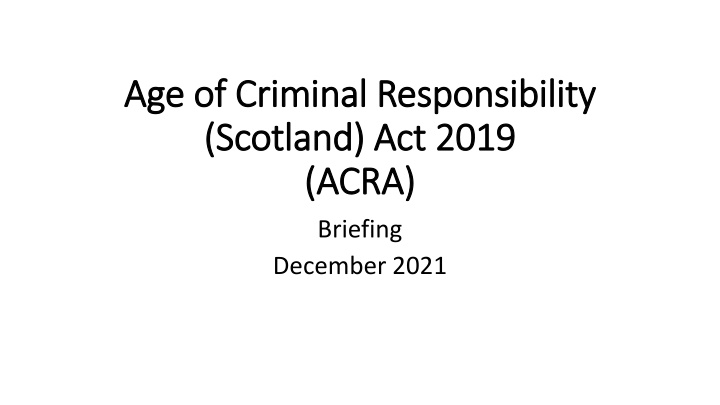

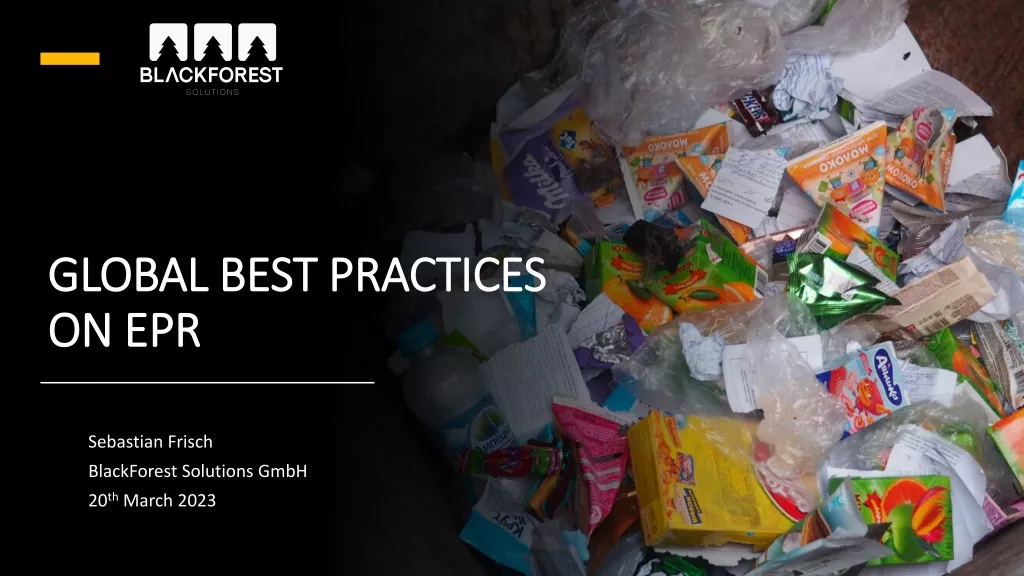
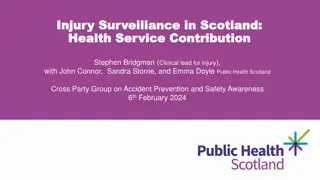
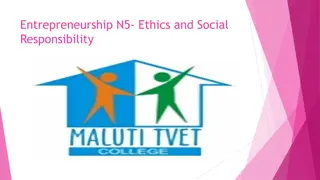
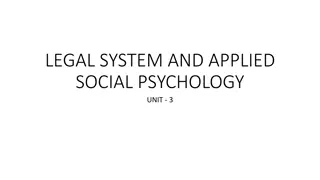
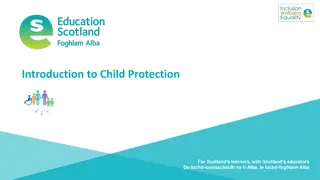
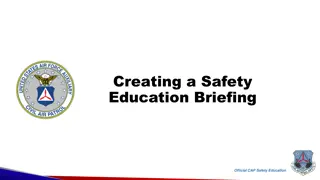
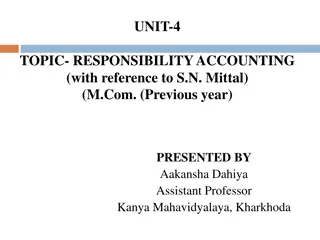
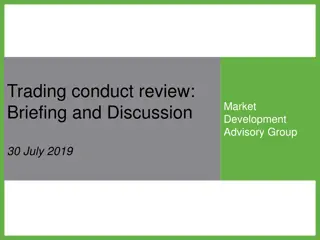

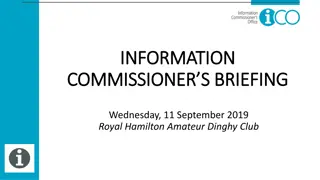
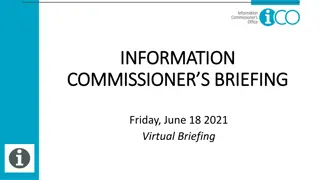
![Briefing on the Criminal Procedure Amendment Bill [B12-2021] to the Portfolio Committee on Justice and Correctional Services](/thumb/157093/briefing-on-the-criminal-procedure-amendment-bill-b12-2021-to-the-portfolio-committee-on-justice-and-correctional-services.jpg)
